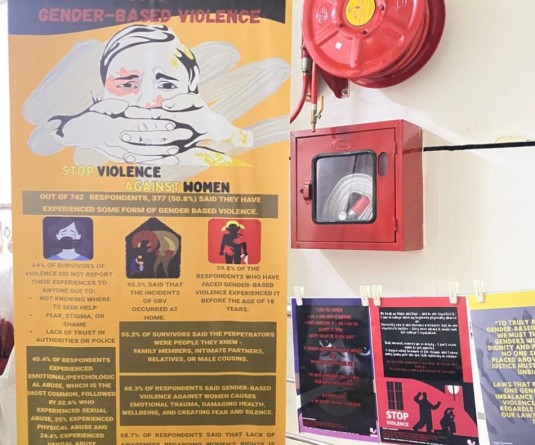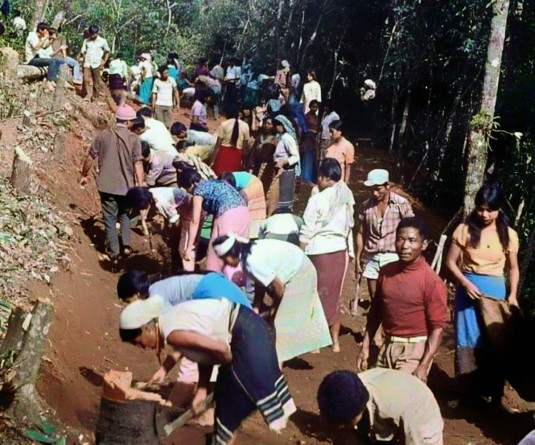Alumni, students and other concerned persons from Nagaland held a solidarity walk and sit-in program on Monday, February 22, against the shrinking space for debate and dissent in the Indian sub-continent. (Morung Photo)
Nagaland expresses solidarity with the rest of the sub-continent
Morung Express News
Dimapur | February 22
“What saddens me more is the silence of our intellectuals, thinkers, writers and poets, who should have analyzed what is happening to JNU as a microcosm of what is happening across the country, particularly what is happening in Nagaland.”
This thought was projected by the Editor of Nagaland Page, Monalisa Changkija today, wishing that “our intellectuals, thinkers, writers and poets” had led the alumni and students community from Nagaland to direct Naga society and State to write a “new civil literature,” a phrase she borrowed from Kekhrie Yhome.
But with or without this leading, alumni of various central universities—particularly Jawaharlal Nehru University (JNU) and Hyderabad Central University (HCU)—in Nagaland today came out in a show of solidarity, along with other likeminded people, through a walk and a sit-in program here for the students/faculty of various central universities currently being hounded by the State.
With lettering on placards reading ‘Justice for Rohit Vemula’, standing by the right to ‘debate, dissent, argue,’ or against oppression of free and critical thinking and arbitrary attacks on the media, Nagaland’s community of alumni exemplified how Nagas today are ready to show solidarity, and walk with, the rest of the world on issues affecting all of us—Against curtailment of Freedom of Speech and Expression, Against growing intolerance in the country, Against attack on Media Freedom.
The event was organised in the backdrop of the events that transpired at JNU and HCU recently.
The sit-in program, held at a parking lot next to SETAM’s campus (Nagaland University), was attended by the alumni as well as other well wishers, old and young. Dimapur Police and administrative officers also attended the program in fair numbers, including women police officers.
“The sight of Kalashnikovs frightens me but we must talk about freedom in this country,” said alumni of JNU, Obee Rose. There are revolutions today in technology, media, fashion etc but people have forgotten about social revolutions, he said.
“We believe in an India where protests can happen without guns,” he reiterated. Reading out a few lines from a book touted to be the “RSS bible,” he called for the gathering to stand for “equality and fraternity”—a society without discrimination along primordial lines.
Alumni of HCU, Chingmai Konyak, reminded that discrimination starts “within us and among us.” “Let us do away with the culture of negative nationalism at least in Nagaland,” he said, enumerating how this culture, propagated by the BJP at the centre, will spread to Nagaland State too, through universities, colleges and the media.
Which is why, this event should be used as a “reflection” on the threat to the “democratic and secular systems” of the country through attacks on the “powerhouses of the society,” its universities, said alumni of JNU, Dr. Lanusangla Tzüdir. Our solidarity, she said, should not be in just words but also in action.
Having studied at Delhi University, Monalisa Changkija observed, “What we have been witness to across the country, in the form of biases, prejudices, intolerance, racism, communalism, corruption, nepotism, injustice, discriminations, etc., are things that have no place in a democracy but nobody thinks of them as unpatriotic, anti-national and against humanity. Today, these have become our culture, eclipsing the essence, the ethos and the values of democracy.”
Without a doubt, these “dark forces” are also “alive, alert and active” in Nagaland, she maintained. Asserting that it is now time to “speak up” against these, she also stated that “if today our political and economic life stands stagnate, it is because of the not-so-subtle subversion of democracy and democratic values, to which we have all contributed to by our silence.”
“JNU has taught us the culture of tolerance and debate, which is why we are here today,” noted alumni of JNU, AG Samuel. Articulating on larger debates of the region, Samuel put to perspective how the Naga people fit into (or not) the “processes of homogenisation” (imposition of Hindi, beef ban etc.) that have gripped the sub-continent.
Reiterating that “solidarity with JNU” is equivalent to “solidarity with democracy,” Samuel stated that the current “either you are with us or against us” attitude of the State will lead to an untoward pushing of the Hindutva and intolerance agenda over the next three years.
Meanwhile, Naga civil society bodies remained conspicuously absent from the event, perhaps in a telling marker that the revolution of, and through, solidarities has gone by them. Times, though, are a-changing.






